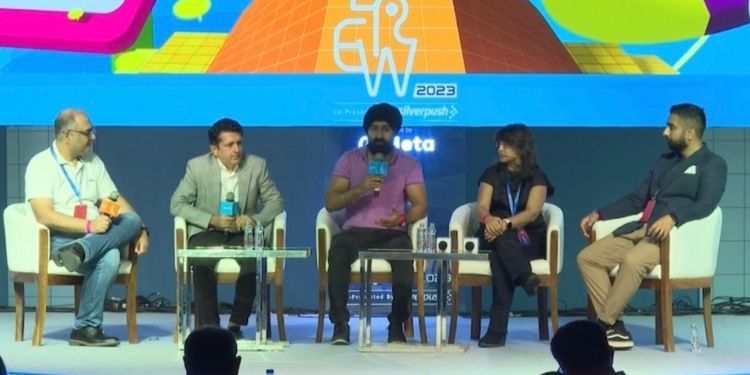‘Generative AI & Future of Creativity’ was among the themes discussed at the sixth edition of GroupM’s ‘Brew’ in Mumbai on October 16, 2023.
The panel was moderated by Tushar Vyas, WPP India and the speakers included Dalbir Singh, VP Global Partnerships, Seedtag; Amin Lakhani, CEO – South Asia, Mindshare; Sidharth Singh, Category Manager, Mondelez International; and Sumeli Chatterjee, Head – Integrated Marketing and Experiences, Coca Cola.
Talking about the tech and brand relationship, Sidharth Singh noted, “All that we do as marketers is in service of having a deeper connection with consumers. All that we have done is enabled by and but also limited by the technology and the tools that have been available. With Gen AI coming in, it’s a leap from where we were and the possibilities are endless. In terms of getting what we know about consumers, processing it, delivering ‘Wow’ content at scale and imaginative solutions at scale, all of those things I feel will go over the top. We are looking at it with a lot of seriousness and excitement. I think it opens exciting possibilities for consumers. Look at what we can do as a marketer today in 2023 versus what we could do when I first came into marketing in 2014. The possibilities are endless and that is why you already see the seeds of it and you see such cutting-edge work happening in marketing.”
Emphasising the importance of context in AI solutions and how to reach out to the right audience in the right context, Dalbir Singh said, “Context has been around for years but it has just reinvented itself and this is where AI helps us, because we need to go far beyond the keyword. It’s not just keywords, it’s image, data, language processing, semantics, sentiment analysis. The key thing about AI is that it is always learning and processing data. We don’t want to use AI for the sake of AI or for just simple tasks. I think it’s very important that we use AI well. It’s important that the targeting contextualisation is working properly.”
Measuring the RoI
On measuring the ROI of all the effort that goes into the area, Chatterjee observed, “The bigger thing that what we have experienced now that we have worked on multiple campaigns which have had AI to varying degrees, is how do we prepare for the ML – it takes time. Most of the time people say ‘let’s go live’. But you can’t go live without a proper demo because there is good and bad and there are odds and AI is a machine and sometimes it breaks down. And we need to know that before we start testing it live. That’s an important part of taking an AI campaign live, whether it is in the media part of it or creation part of it or amplification part. With AI there is always a little bit of unpredictability because it works on logic but if you haven’t thought through every logic, sometimes biases can creep in.”
The speaker underlined the importance of absolute transparency – of people sitting down and putting down things that can go wrong. Sometimes even practitioners cannot imagine where it can go wrong because it’s not something which has a precedent, she explained.
On the subject of measurability,Chatterjee pointed out that while everyone is very excited about usage of AI, there is a lack of understanding of the measurement and the impact on the business.
“For us as brand owners, I think everything starts from a business need inside and then AI is a tool. Now how you use the tool depends on how much you can integrate and how best the solution provider can bring the solution. It will be great if teams do work on it and prep on it because it is a new tech; so while there is a lot of charm on the rewards of it and the glory of it people also need to know the rigour that goes behind it and most often than not people kind of miss it,” the speaker explained.
‘I don’t think we have a choice’
Lakhani noted, “To me, what AI has done is to bring back the attention to this classical debate, which is man over machine and machine over man. And this debate has been going on since the invention of the first machine. AI has again brought attention to the question about whether we really need to use this machine or not. I don’t think we have a choice. The consumer has really moved far ahead and to decode that and to win them over, adopting this machine and mastering it is the need of the hour.”
AI has a key role in decoding the complex ecosystem into simple decision-making metrics, he added.
The panel went on to discuss the most interesting developments that the world has seen at the intersection of AI and creativity.
Dalbir Singh observed that with everything powered by data, the role of AI is centred around context. He explained: “Adapting the creative depending on the context – I think that’s important. But still having that human layer is needed just to make sure AI doesn’t go out of control.”
Co-creating with AI
“Decades back we were in a broadcast economy so brands were creating, consumers consuming. Then we came into a participation economy – with brands creating, consumers creating. I think what’s interesting with generative AI specifically is that brands and creators and consumers can actually create together with the great understanding for each other, enabled by AI. That I think is a fabulous space for everybody coming together and doing their own bit and growing it together with the same ethos,” noted Chatterjee.
She ceded that there are risks involved, but added that we will overcome those “as we always do”.
Sidharth Singh said, “In the last couple of decades, tech has become such an integral part of our lives, providing solutions to all its different facets. Now, with this sort of step jump coming in with AI, the capabilities and the quality of everything will improve over the next two to three years. But the other thing that happens typically is that one evolved tech works in coordination with another and the combination in technology is able to solve very specific human challenges. As the power of the tech compounds, I think the solution and things that will come out of it will surprise us. There are a lot of possibilities there and I am looking forward to that.”
Lakhani surmised, “To me, it’s like a vicious circle and a positive one. If you divide your intellectual time, 80 pc goes into doing repetitive tasks, into tasks that can be avoided. I am waiting for AI to truly unlock its potential to help us reduce that 80 pc, so that it frees our time to think creatively, to have some time for ourselves and to raise the conversation and engagement for the entire ecosystem.”
Also read:

















